Service Encounter and Managerial Implications for Virgin Australia
VerifiedAdded on 2020/03/07
|8
|1650
|63
Report
AI Summary
This report examines Virgin Australia's service organization, highlighting the roles of both front-stage and back-stage employees. Front-stage employees, including ground staff and cabin crew, are crucial for customer interaction and satisfaction, while back-stage employees, such as the marketing, finance, and operations teams, focus on customer service plans and loyalty programs. The report emphasizes the significance of employee empowerment, IT utilization, recruitment, training, and pay-for-performance in delivering efficient services. It also explores the importance of service encounters and managerial implications, including pre-core, core, and post-core service encounters, and the need for managers to monitor and guide employees to ensure customer satisfaction. The analysis references the importance of customer satisfaction and retention in the airline industry.
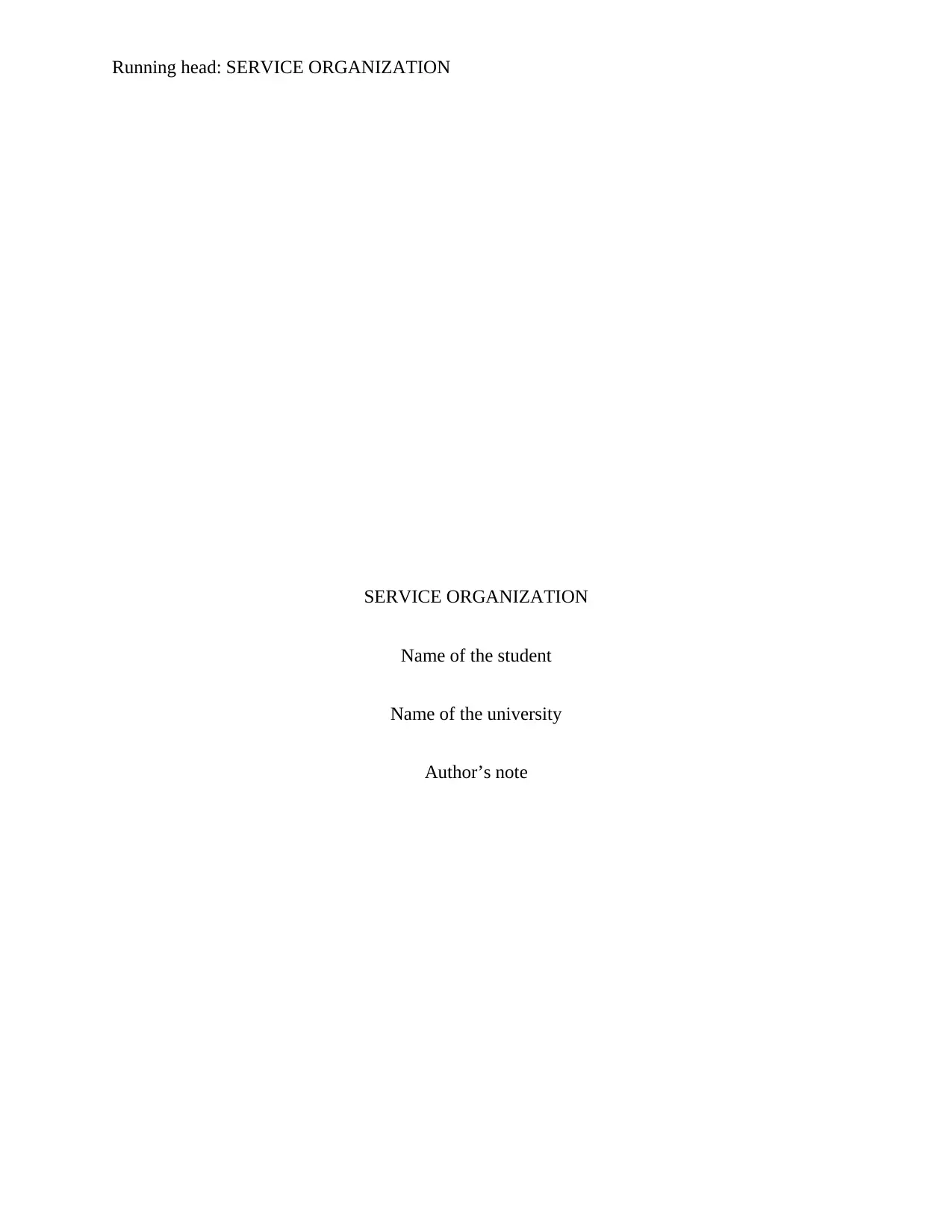
Running head: SERVICE ORGANIZATION
SERVICE ORGANIZATION
Name of the student
Name of the university
Author’s note
SERVICE ORGANIZATION
Name of the student
Name of the university
Author’s note
Paraphrase This Document
Need a fresh take? Get an instant paraphrase of this document with our AI Paraphraser
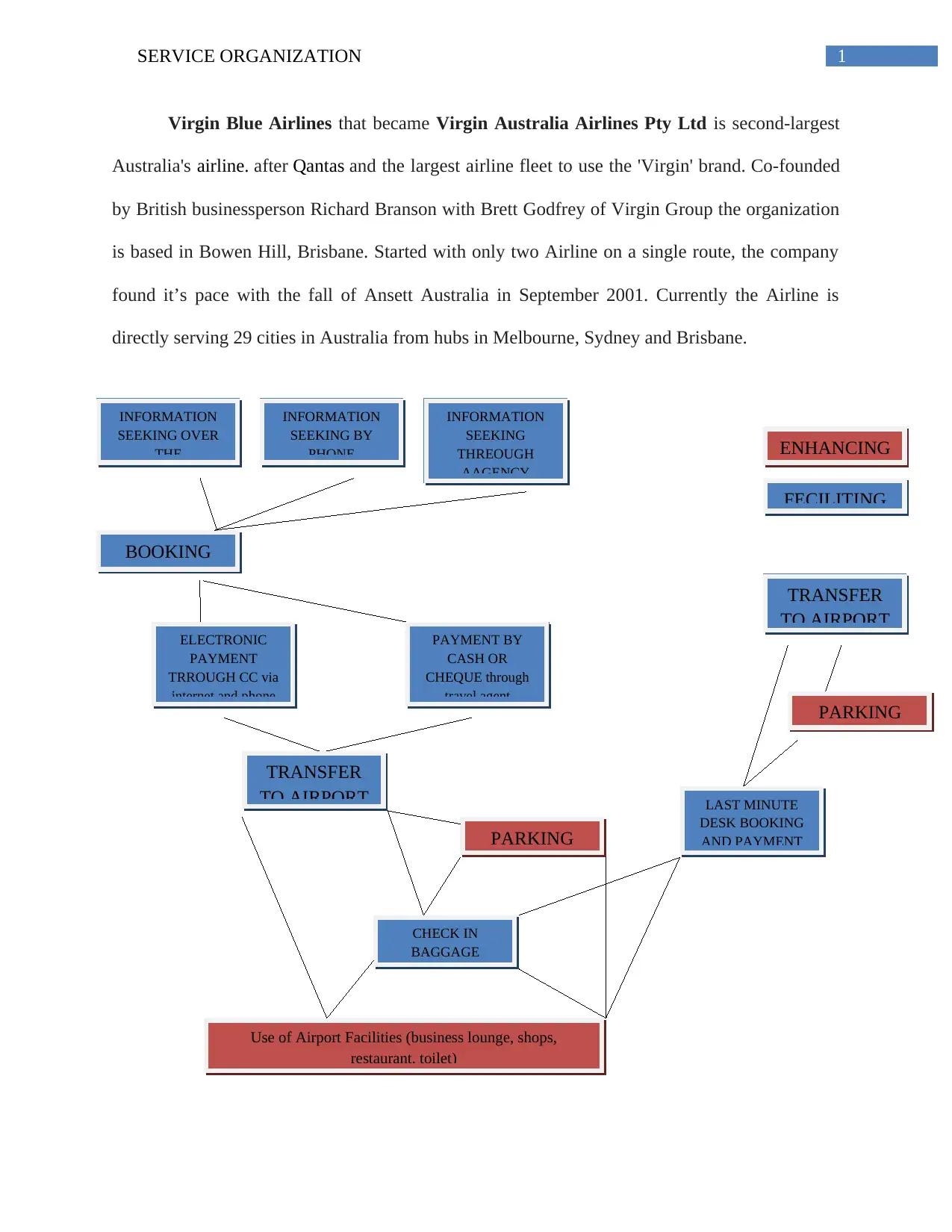
1SERVICE ORGANIZATION
Virgin Blue Airlines that became Virgin Australia Airlines Pty Ltd is second-largest
Australia's airline. after Qantas and the largest airline fleet to use the 'Virgin' brand. Co-founded
by British businessperson Richard Branson with Brett Godfrey of Virgin Group the organization
is based in Bowen Hill, Brisbane. Started with only two Airline on a single route, the company
found it’s pace with the fall of Ansett Australia in September 2001. Currently the Airline is
directly serving 29 cities in Australia from hubs in Melbourne, Sydney and Brisbane.
ENHANCING
FECILITING
PARKING
ELECTRONIC
PAYMENT
TRROUGH CC via
internet and phone
INFORMATION
SEEKING BY
PHONE
INFORMATION
SEEKING OVER
THE
INFORMATION
SEEKING
THREOUGH
AAGENCY
LAST MINUTE
DESK BOOKING
AND PAYMENT
TRANSFER
TO AIRPORT
BOOKING
PAYMENT BY
CASH OR
CHEQUE through
travel agent
TRANSFER
TO AIRPORT
PARKING
CHECK IN
BAGGAGE
Use of Airport Facilities (business lounge, shops,
restaurant, toilet)
Virgin Blue Airlines that became Virgin Australia Airlines Pty Ltd is second-largest
Australia's airline. after Qantas and the largest airline fleet to use the 'Virgin' brand. Co-founded
by British businessperson Richard Branson with Brett Godfrey of Virgin Group the organization
is based in Bowen Hill, Brisbane. Started with only two Airline on a single route, the company
found it’s pace with the fall of Ansett Australia in September 2001. Currently the Airline is
directly serving 29 cities in Australia from hubs in Melbourne, Sydney and Brisbane.
ENHANCING
FECILITING
PARKING
ELECTRONIC
PAYMENT
TRROUGH CC via
internet and phone
INFORMATION
SEEKING BY
PHONE
INFORMATION
SEEKING OVER
THE
INFORMATION
SEEKING
THREOUGH
AAGENCY
LAST MINUTE
DESK BOOKING
AND PAYMENT
TRANSFER
TO AIRPORT
BOOKING
PAYMENT BY
CASH OR
CHEQUE through
travel agent
TRANSFER
TO AIRPORT
PARKING
CHECK IN
BAGGAGE
Use of Airport Facilities (business lounge, shops,
restaurant, toilet)
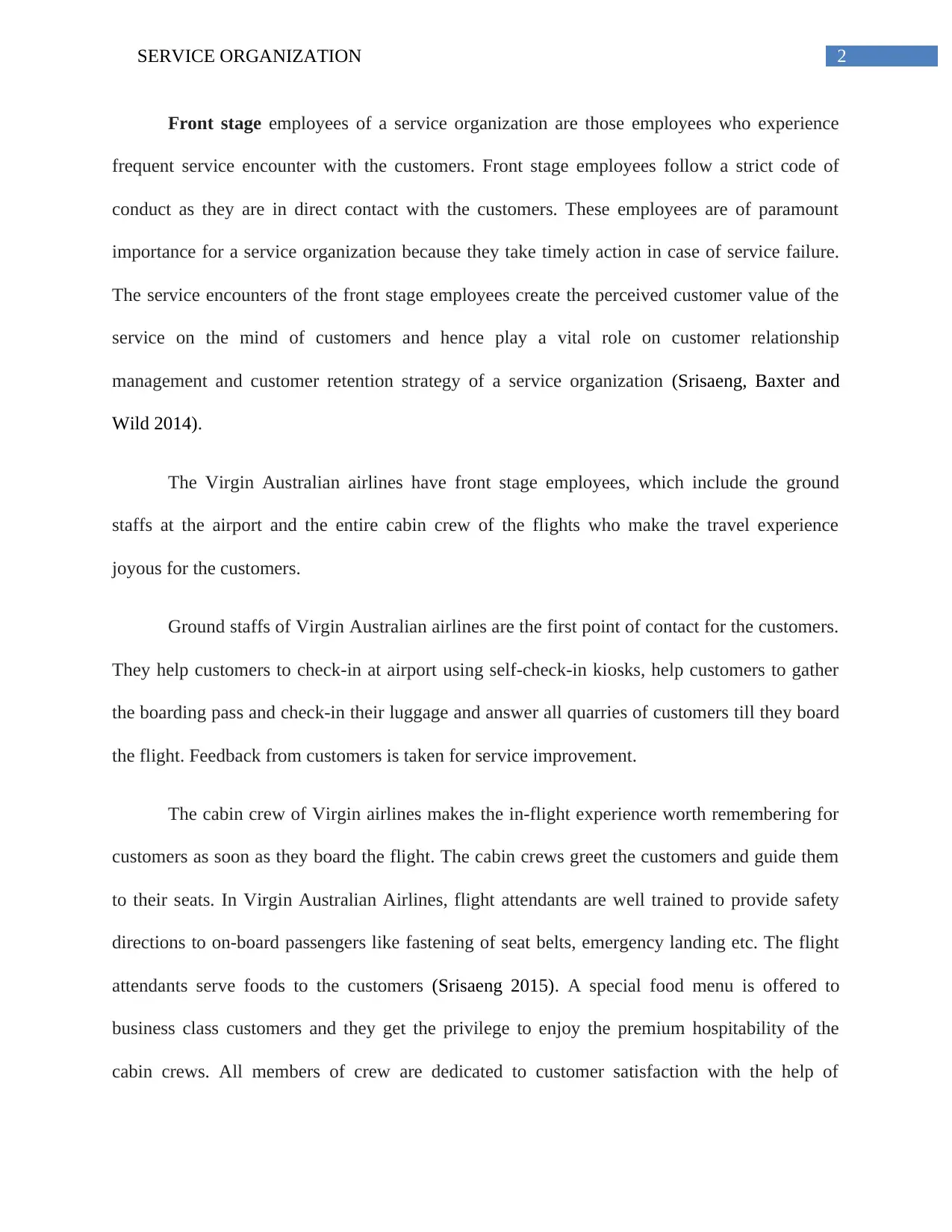
2SERVICE ORGANIZATION
Front stage employees of a service organization are those employees who experience
frequent service encounter with the customers. Front stage employees follow a strict code of
conduct as they are in direct contact with the customers. These employees are of paramount
importance for a service organization because they take timely action in case of service failure.
The service encounters of the front stage employees create the perceived customer value of the
service on the mind of customers and hence play a vital role on customer relationship
management and customer retention strategy of a service organization (Srisaeng, Baxter and
Wild 2014).
The Virgin Australian airlines have front stage employees, which include the ground
staffs at the airport and the entire cabin crew of the flights who make the travel experience
joyous for the customers.
Ground staffs of Virgin Australian airlines are the first point of contact for the customers.
They help customers to check-in at airport using self-check-in kiosks, help customers to gather
the boarding pass and check-in their luggage and answer all quarries of customers till they board
the flight. Feedback from customers is taken for service improvement.
The cabin crew of Virgin airlines makes the in-flight experience worth remembering for
customers as soon as they board the flight. The cabin crews greet the customers and guide them
to their seats. In Virgin Australian Airlines, flight attendants are well trained to provide safety
directions to on-board passengers like fastening of seat belts, emergency landing etc. The flight
attendants serve foods to the customers (Srisaeng 2015). A special food menu is offered to
business class customers and they get the privilege to enjoy the premium hospitability of the
cabin crews. All members of crew are dedicated to customer satisfaction with the help of
Front stage employees of a service organization are those employees who experience
frequent service encounter with the customers. Front stage employees follow a strict code of
conduct as they are in direct contact with the customers. These employees are of paramount
importance for a service organization because they take timely action in case of service failure.
The service encounters of the front stage employees create the perceived customer value of the
service on the mind of customers and hence play a vital role on customer relationship
management and customer retention strategy of a service organization (Srisaeng, Baxter and
Wild 2014).
The Virgin Australian airlines have front stage employees, which include the ground
staffs at the airport and the entire cabin crew of the flights who make the travel experience
joyous for the customers.
Ground staffs of Virgin Australian airlines are the first point of contact for the customers.
They help customers to check-in at airport using self-check-in kiosks, help customers to gather
the boarding pass and check-in their luggage and answer all quarries of customers till they board
the flight. Feedback from customers is taken for service improvement.
The cabin crew of Virgin airlines makes the in-flight experience worth remembering for
customers as soon as they board the flight. The cabin crews greet the customers and guide them
to their seats. In Virgin Australian Airlines, flight attendants are well trained to provide safety
directions to on-board passengers like fastening of seat belts, emergency landing etc. The flight
attendants serve foods to the customers (Srisaeng 2015). A special food menu is offered to
business class customers and they get the privilege to enjoy the premium hospitability of the
cabin crews. All members of crew are dedicated to customer satisfaction with the help of
⊘ This is a preview!⊘
Do you want full access?
Subscribe today to unlock all pages.

Trusted by 1+ million students worldwide
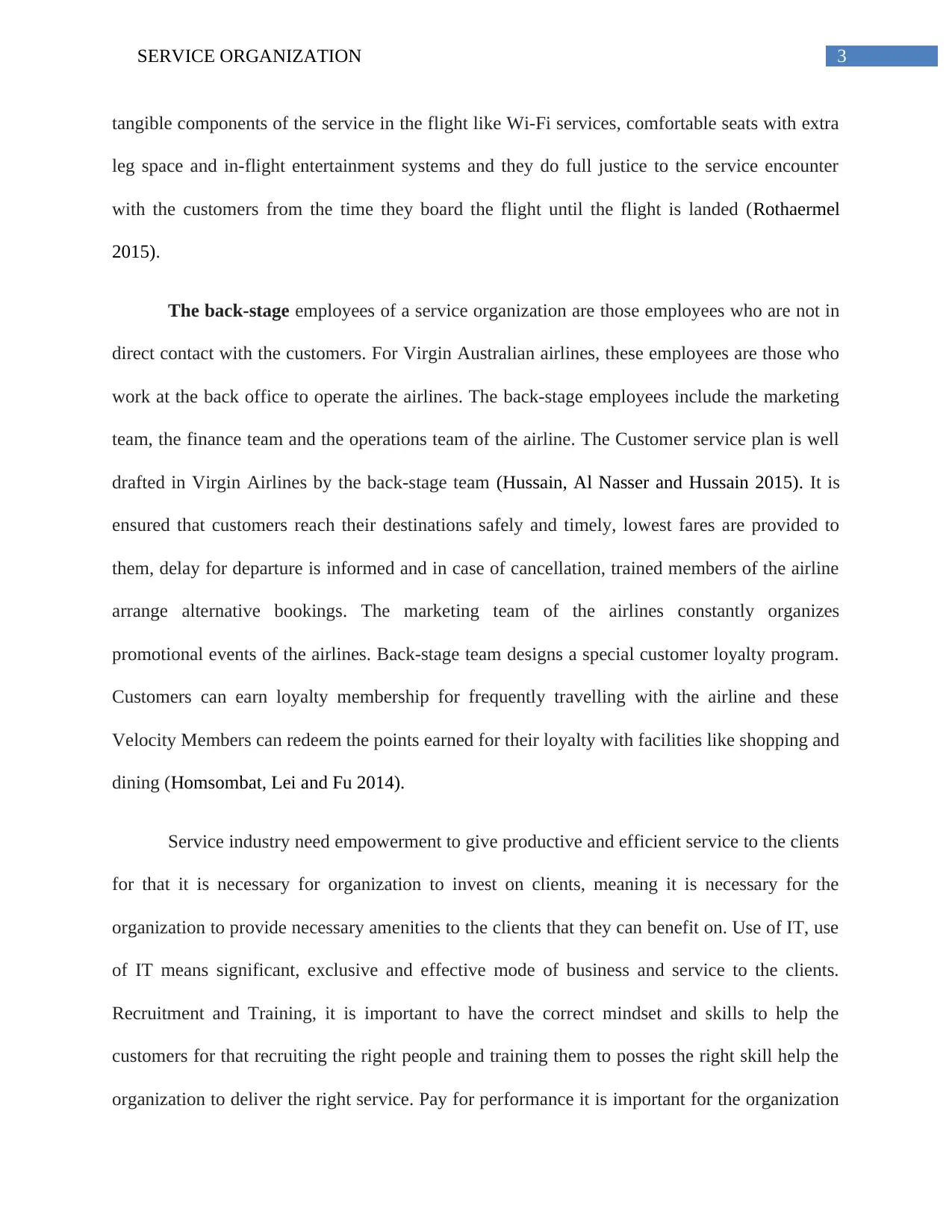
3SERVICE ORGANIZATION
tangible components of the service in the flight like Wi-Fi services, comfortable seats with extra
leg space and in-flight entertainment systems and they do full justice to the service encounter
with the customers from the time they board the flight until the flight is landed (Rothaermel
2015).
The back-stage employees of a service organization are those employees who are not in
direct contact with the customers. For Virgin Australian airlines, these employees are those who
work at the back office to operate the airlines. The back-stage employees include the marketing
team, the finance team and the operations team of the airline. The Customer service plan is well
drafted in Virgin Airlines by the back-stage team (Hussain, Al Nasser and Hussain 2015). It is
ensured that customers reach their destinations safely and timely, lowest fares are provided to
them, delay for departure is informed and in case of cancellation, trained members of the airline
arrange alternative bookings. The marketing team of the airlines constantly organizes
promotional events of the airlines. Back-stage team designs a special customer loyalty program.
Customers can earn loyalty membership for frequently travelling with the airline and these
Velocity Members can redeem the points earned for their loyalty with facilities like shopping and
dining (Homsombat, Lei and Fu 2014).
Service industry need empowerment to give productive and efficient service to the clients
for that it is necessary for organization to invest on clients, meaning it is necessary for the
organization to provide necessary amenities to the clients that they can benefit on. Use of IT, use
of IT means significant, exclusive and effective mode of business and service to the clients.
Recruitment and Training, it is important to have the correct mindset and skills to help the
customers for that recruiting the right people and training them to posses the right skill help the
organization to deliver the right service. Pay for performance it is important for the organization
tangible components of the service in the flight like Wi-Fi services, comfortable seats with extra
leg space and in-flight entertainment systems and they do full justice to the service encounter
with the customers from the time they board the flight until the flight is landed (Rothaermel
2015).
The back-stage employees of a service organization are those employees who are not in
direct contact with the customers. For Virgin Australian airlines, these employees are those who
work at the back office to operate the airlines. The back-stage employees include the marketing
team, the finance team and the operations team of the airline. The Customer service plan is well
drafted in Virgin Airlines by the back-stage team (Hussain, Al Nasser and Hussain 2015). It is
ensured that customers reach their destinations safely and timely, lowest fares are provided to
them, delay for departure is informed and in case of cancellation, trained members of the airline
arrange alternative bookings. The marketing team of the airlines constantly organizes
promotional events of the airlines. Back-stage team designs a special customer loyalty program.
Customers can earn loyalty membership for frequently travelling with the airline and these
Velocity Members can redeem the points earned for their loyalty with facilities like shopping and
dining (Homsombat, Lei and Fu 2014).
Service industry need empowerment to give productive and efficient service to the clients
for that it is necessary for organization to invest on clients, meaning it is necessary for the
organization to provide necessary amenities to the clients that they can benefit on. Use of IT, use
of IT means significant, exclusive and effective mode of business and service to the clients.
Recruitment and Training, it is important to have the correct mindset and skills to help the
customers for that recruiting the right people and training them to posses the right skill help the
organization to deliver the right service. Pay for performance it is important for the organization
Paraphrase This Document
Need a fresh take? Get an instant paraphrase of this document with our AI Paraphraser
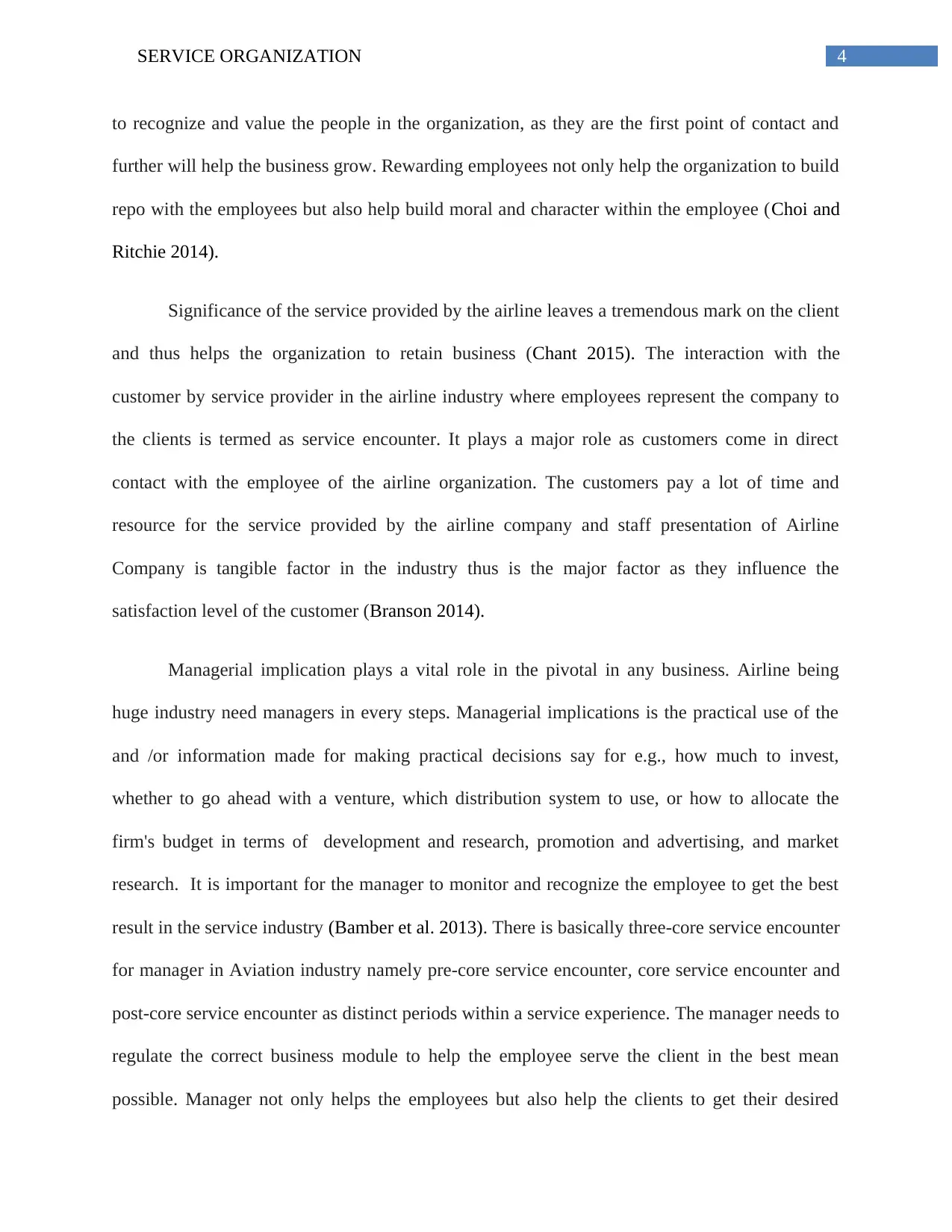
4SERVICE ORGANIZATION
to recognize and value the people in the organization, as they are the first point of contact and
further will help the business grow. Rewarding employees not only help the organization to build
repo with the employees but also help build moral and character within the employee (Choi and
Ritchie 2014).
Significance of the service provided by the airline leaves a tremendous mark on the client
and thus helps the organization to retain business (Chant 2015). The interaction with the
customer by service provider in the airline industry where employees represent the company to
the clients is termed as service encounter. It plays a major role as customers come in direct
contact with the employee of the airline organization. The customers pay a lot of time and
resource for the service provided by the airline company and staff presentation of Airline
Company is tangible factor in the industry thus is the major factor as they influence the
satisfaction level of the customer (Branson 2014).
Managerial implication plays a vital role in the pivotal in any business. Airline being
huge industry need managers in every steps. Managerial implications is the practical use of the
and /or information made for making practical decisions say for e.g., how much to invest,
whether to go ahead with a venture, which distribution system to use, or how to allocate the
firm's budget in terms of development and research, promotion and advertising, and market
research. It is important for the manager to monitor and recognize the employee to get the best
result in the service industry (Bamber et al. 2013). There is basically three-core service encounter
for manager in Aviation industry namely pre-core service encounter, core service encounter and
post-core service encounter as distinct periods within a service experience. The manager needs to
regulate the correct business module to help the employee serve the client in the best mean
possible. Manager not only helps the employees but also help the clients to get their desired
to recognize and value the people in the organization, as they are the first point of contact and
further will help the business grow. Rewarding employees not only help the organization to build
repo with the employees but also help build moral and character within the employee (Choi and
Ritchie 2014).
Significance of the service provided by the airline leaves a tremendous mark on the client
and thus helps the organization to retain business (Chant 2015). The interaction with the
customer by service provider in the airline industry where employees represent the company to
the clients is termed as service encounter. It plays a major role as customers come in direct
contact with the employee of the airline organization. The customers pay a lot of time and
resource for the service provided by the airline company and staff presentation of Airline
Company is tangible factor in the industry thus is the major factor as they influence the
satisfaction level of the customer (Branson 2014).
Managerial implication plays a vital role in the pivotal in any business. Airline being
huge industry need managers in every steps. Managerial implications is the practical use of the
and /or information made for making practical decisions say for e.g., how much to invest,
whether to go ahead with a venture, which distribution system to use, or how to allocate the
firm's budget in terms of development and research, promotion and advertising, and market
research. It is important for the manager to monitor and recognize the employee to get the best
result in the service industry (Bamber et al. 2013). There is basically three-core service encounter
for manager in Aviation industry namely pre-core service encounter, core service encounter and
post-core service encounter as distinct periods within a service experience. The manager needs to
regulate the correct business module to help the employee serve the client in the best mean
possible. Manager not only helps the employees but also help the clients to get their desired
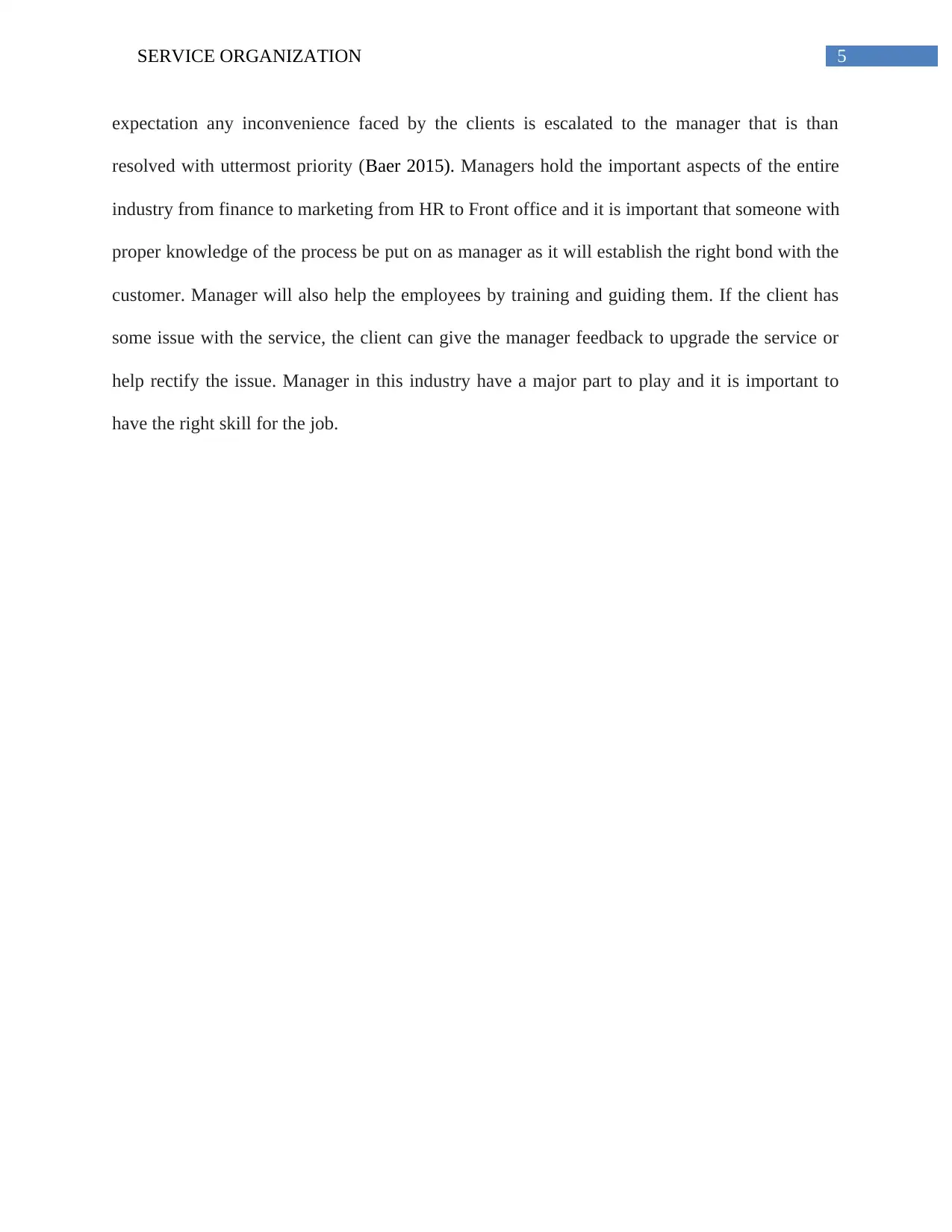
5SERVICE ORGANIZATION
expectation any inconvenience faced by the clients is escalated to the manager that is than
resolved with uttermost priority (Baer 2015). Managers hold the important aspects of the entire
industry from finance to marketing from HR to Front office and it is important that someone with
proper knowledge of the process be put on as manager as it will establish the right bond with the
customer. Manager will also help the employees by training and guiding them. If the client has
some issue with the service, the client can give the manager feedback to upgrade the service or
help rectify the issue. Manager in this industry have a major part to play and it is important to
have the right skill for the job.
expectation any inconvenience faced by the clients is escalated to the manager that is than
resolved with uttermost priority (Baer 2015). Managers hold the important aspects of the entire
industry from finance to marketing from HR to Front office and it is important that someone with
proper knowledge of the process be put on as manager as it will establish the right bond with the
customer. Manager will also help the employees by training and guiding them. If the client has
some issue with the service, the client can give the manager feedback to upgrade the service or
help rectify the issue. Manager in this industry have a major part to play and it is important to
have the right skill for the job.
⊘ This is a preview!⊘
Do you want full access?
Subscribe today to unlock all pages.

Trusted by 1+ million students worldwide
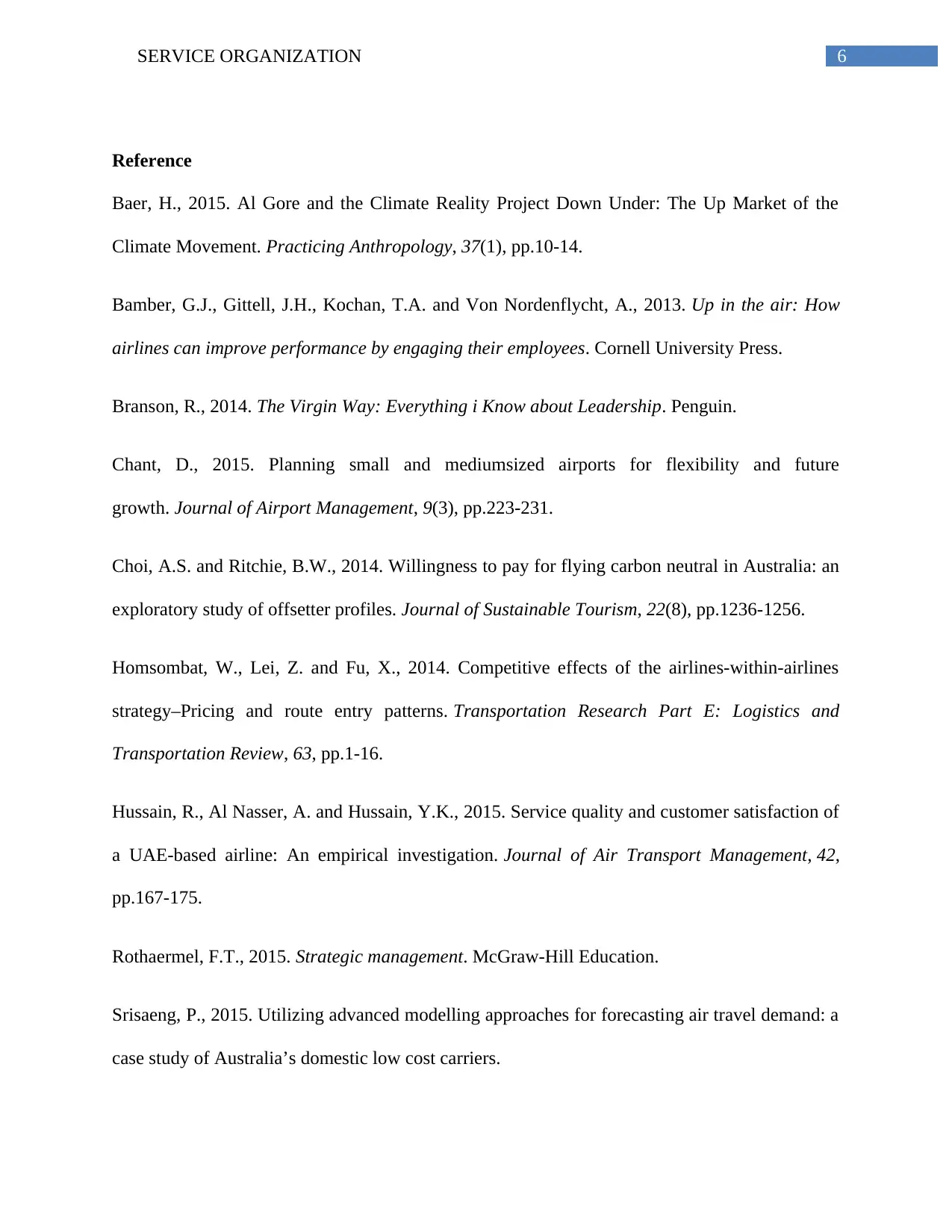
6SERVICE ORGANIZATION
Reference
Baer, H., 2015. Al Gore and the Climate Reality Project Down Under: The Up Market of the
Climate Movement. Practicing Anthropology, 37(1), pp.10-14.
Bamber, G.J., Gittell, J.H., Kochan, T.A. and Von Nordenflycht, A., 2013. Up in the air: How
airlines can improve performance by engaging their employees. Cornell University Press.
Branson, R., 2014. The Virgin Way: Everything i Know about Leadership. Penguin.
Chant, D., 2015. Planning small and mediumsized airports for flexibility and future
growth. Journal of Airport Management, 9(3), pp.223-231.
Choi, A.S. and Ritchie, B.W., 2014. Willingness to pay for flying carbon neutral in Australia: an
exploratory study of offsetter profiles. Journal of Sustainable Tourism, 22(8), pp.1236-1256.
Homsombat, W., Lei, Z. and Fu, X., 2014. Competitive effects of the airlines-within-airlines
strategy–Pricing and route entry patterns. Transportation Research Part E: Logistics and
Transportation Review, 63, pp.1-16.
Hussain, R., Al Nasser, A. and Hussain, Y.K., 2015. Service quality and customer satisfaction of
a UAE-based airline: An empirical investigation. Journal of Air Transport Management, 42,
pp.167-175.
Rothaermel, F.T., 2015. Strategic management. McGraw-Hill Education.
Srisaeng, P., 2015. Utilizing advanced modelling approaches for forecasting air travel demand: a
case study of Australia’s domestic low cost carriers.
Reference
Baer, H., 2015. Al Gore and the Climate Reality Project Down Under: The Up Market of the
Climate Movement. Practicing Anthropology, 37(1), pp.10-14.
Bamber, G.J., Gittell, J.H., Kochan, T.A. and Von Nordenflycht, A., 2013. Up in the air: How
airlines can improve performance by engaging their employees. Cornell University Press.
Branson, R., 2014. The Virgin Way: Everything i Know about Leadership. Penguin.
Chant, D., 2015. Planning small and mediumsized airports for flexibility and future
growth. Journal of Airport Management, 9(3), pp.223-231.
Choi, A.S. and Ritchie, B.W., 2014. Willingness to pay for flying carbon neutral in Australia: an
exploratory study of offsetter profiles. Journal of Sustainable Tourism, 22(8), pp.1236-1256.
Homsombat, W., Lei, Z. and Fu, X., 2014. Competitive effects of the airlines-within-airlines
strategy–Pricing and route entry patterns. Transportation Research Part E: Logistics and
Transportation Review, 63, pp.1-16.
Hussain, R., Al Nasser, A. and Hussain, Y.K., 2015. Service quality and customer satisfaction of
a UAE-based airline: An empirical investigation. Journal of Air Transport Management, 42,
pp.167-175.
Rothaermel, F.T., 2015. Strategic management. McGraw-Hill Education.
Srisaeng, P., 2015. Utilizing advanced modelling approaches for forecasting air travel demand: a
case study of Australia’s domestic low cost carriers.
Paraphrase This Document
Need a fresh take? Get an instant paraphrase of this document with our AI Paraphraser

7SERVICE ORGANIZATION
Srisaeng, P., Baxter, G.S. and Wild, G., 2014. The evolution of low cost carriers in
Australia. Aviation, 18(4), pp.203-216.
Srisaeng, P., Baxter, G.S. and Wild, G., 2014. The evolution of low cost carriers in
Australia. Aviation, 18(4), pp.203-216.
1 out of 8
Related Documents
Your All-in-One AI-Powered Toolkit for Academic Success.
+13062052269
info@desklib.com
Available 24*7 on WhatsApp / Email
![[object Object]](/_next/static/media/star-bottom.7253800d.svg)
Unlock your academic potential
Copyright © 2020–2026 A2Z Services. All Rights Reserved. Developed and managed by ZUCOL.



